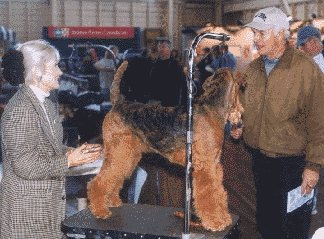Housebreaking your new puppy can be as easy or as difficult as you want to make it. Housesoiling is a terminal illness for almost all dogs if not corrected. By that we mean the dog that does not learn the rules of the house will be gotten rid of one way or another. Remember – the younger your puppy, the shorter the period of time that he can physically hold it. Also, very few puppies are 100% trustworthy until at least 6 months.
1. CONFINE YOUR PUPPY He must always be in sight of you when loose in the house. A room with a linoleum floor or other easily cleaned floor will be the easiest for you. If you are busy and cannot watch him, confine him to a crate. This is not punishment, but his own special place. In the wild this would be his den. If you will not use a crate, confine him to a small area of the kitchen where you can clean up the accidents he will have.
2. FEED ON SCHEDULE If you establish a routine in feeding, it will be easier to °know when to take the pup out to eliminate. Most dogs need to get outside shortly after eating and after they wake up from a nap. Take all food and water away from the dog at 6:00 pm. Take him outside several times after this time so that he may eliminate before going to his bed for the night. Do not give him treats all evening no matter how cute he is or how much he begs, puppies get diarrhea quickly and no dog can control himself when that happens. Never punish a dog for housesoiling if he has diarrhea. Think about how you feel – can you control yourself? Neither can your dog!
3. CATCHING THE DOG IN THE ACT If you see the pup starting to relieve himself in the house, get his attention and get him outside. Most dogs will stop if you distract them by calling their name. Do not punish the dog if he has an accident, it was your fault not watching closely enough. Punishing the dog often causes the dog to wait to eliminate in front of you. If an accident happens, put the dog outside, clean up, and watch him closer next time. NEVER rub the pup’s nose in the mess.
4. SPECIAL WORDS FOR ELIMINATION Each time you take your dog outside to go, take him to the same area and praise profusely when he eliminates. It will help the dog learn if you say a word or phrase that he can learn. We use
“Do your duty” or “Go potty”. At the early stages of housebreaking, you should go out with the dog each time so that you can praise and control where he eliminates. When he is older and knows the rules, in a month or two, he will only need a reminder once in a while.
5. ODOR PREVENTION Keeping the odor down is as important outside as it is inside. Most dogs will not return to an area littered with stools. They are basically clean animals and while they do sniff the area, they are just checking to see if a stranger has been there, not just enjoying the smells. In the house, accidents must be cleaned totally or the dog will keep returning to that spot. A product that works exceptionally well is “OUTRIGHT” or “SIMPLE SOLUTION”. You can purchase it at most pet stores. It is an enzymeactivated product that removes the odor rather than just covering it up.
www.tartanscottshire.com
Please view this article in PDF format: http://www.penaire.com/dlhousebreaking.PDF

